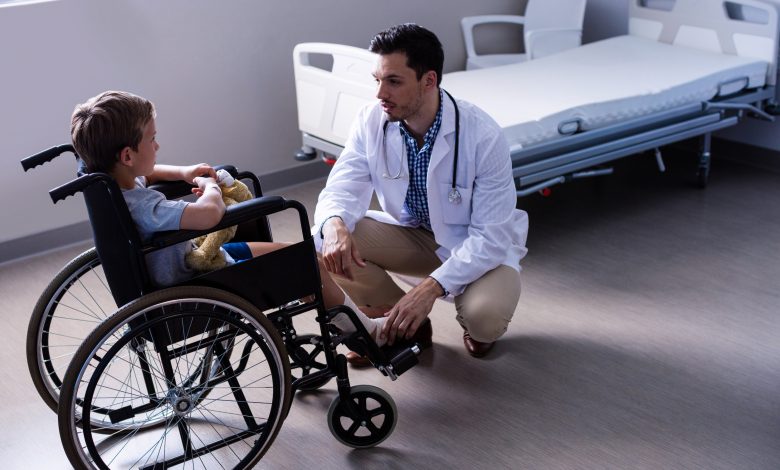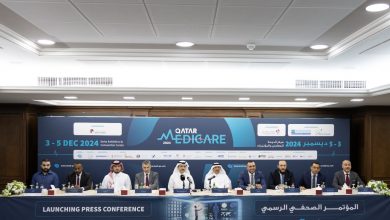
HMC’s Pediatric Rehabilitation Department Currently Caring for Over 500 Children with CP
مركز قطر لإعادة التأهيل يقدم الرعاية الصحية لأكثر من ٥٠٠ طفل مريض بالشلل الدماغي
QNA
Doha: Each year the Pediatric Rehabilitation Department at Hamad Medical Corporation’s (HMC) Qatar Rehabilitation Institute (QRI) cares for over 500 children with cerebral palsy and similar disorders, with up to 5,000 annual patient visits to rehab clinics recorded each year.
Cerebral palsy is the leading cause of childhood physical disabilities, affecting muscle movement, coordination, and posture. Treatment for the condition aims to increase mobility and promote physical and emotional development. Dr. Mahmoud Ibrahim Abeidah, Head of Pediatric Rehabilitation at QRI said while the COVID-19 pandemic has changed every aspect of how healthcare is delivered, his team has worked to ensure patients continue to have access to the support they need.
“There is no cure for cerebral palsy. Every child with CP presents differently and has different needs. Early intervention and ongoing medical treatment, which can include therapy for movement, learning, speech, hearing, and social and emotional development, are essential to helping children with CP reach their full potential,” said Dr. Abeidah.
“Individuals with CP often need ongoing care. Some require more monitoring than others, including frequent blood tests, imaging, clinical examinations, and review of their equipment. Management of these individuals created many challenges as public health measures put in place to contain and curb the spread of COVID-19 meant that many treatments and hands-on therapies were only available for the most critical of cases. Accessible and continuous care during the pandemic was, and continues to be, crucial to caring for children with CP and specifically to minimize the risk of complications such as hip dysplasia,” said Dr. Abeidah.
Dr. Abeidah explains that while CP on its own is not considered a risk factor for COVID-19, individuals with neurological disorders such as CP often have comorbidities, such as chronic lung disease, which is a known risk factor for more severe COVID-19 illness. He said as COVID-19 began spreading and it became evident that service delivery would be affected, his team started adapting treatment programs so that therapy services were not interrupted. He said this involved determining which patients required urgent attention and intervention and which should be admitted as inpatients.
“COVID-19 challenged us in that we needed to ensure our patients continued to have access to the therapy interventions they required while also ensuring their potential exposure to the COVID-19 virus was minimized. Here at HMC, we adopt a family-centered model of care where family and caregivers are involved in every decision made about their child’s treatment,” said Dr. Abeidah.
“Our multidisciplinary team worked with families to meet the individual needs of each patient. Throughout the pandemic, we were fortunate enough to be able to fully utilize our seven-bed inpatient unit to admit children with the most urgent or complex care needs. This allowed us to ensure these children had access to the medical care they needed. Our priority was to provide the right care, at the right time, and in the right location, and to support the families of our patients. With the gradual lifting of restrictions, we have begun welcoming patients back into our day care clinics, but we will continue to provide some services virtually,” said Dr. Abeidah.
Dr. Abeidah said while telemedicine will never replace in-person care for patients with CP, the pandemic has demonstrated how valuable virtual services can be. He said it has also provided his team with an opportunity to explore alternative methods of service delivery. Dr. Abeidah says virtual services provided by his team were instrumental in reassuring families and minimizing deterioration and irreversible physical, functional, emotional, and behavioral damages that could have occurred due to the suspension of outpatient clinical services.
“As we work towards our new normal’, the Pediatric Rehabilitation Department here at QRI will continue to provide a mix of in-person and virtual services, ensuring each patient can safely receive the care they need,” said Dr. Abeidah.
قنا
الدوحة: يقدم قسم تأهيل الأطفال في مركز قطر لإعادة التأهيل التابع لمؤسسة حمد الطبية الرعاية الصحية اللازمة لما يزيد على 500 من مرضى الشلل الدماغي والاضطرابات المماثلة الأخرى من الأطفال سنويا، بينما يقدر عدد الزيارات العلاجية لهؤلاء الأطفال لعيادات التأهيل في المركز بحوالي 5 آلاف زيارة في كل عام.
وقال الدكتور محمود إبراهيم عبيده رئيس قسم تأهيل الأطفال في مركز قطر لإعادة التأهيل، إن الشلل الدماغي يعد من أهم مسببات الإعاقة لدى الأطفال، حيث يحد من حركة عضلات الجسم ويعيق التنسيق الوظائفي الذاتي لأعضاء الجسم، كما يؤثر سلبا في وضعية قامة الجسم ويعمل على تشوهها.
وأشار إلى ان عملية معالجة هذا المرض تهدف إلى زيادة القدرات الحركية ودعم النمو الجسدي والنفسي للطفل المصاب، مؤكدا ان فريق العمل في المركز ورغم جائحة كورونا يواصل تقديم الدعم لهؤلاء المرضى وتمكينهم من الحصول على الرعاية الصحية المتخصصة التي يحتاجونها.
وأضاف أن البدء المبكر في التدخل العلاجي لهذا المرض والذي يشمل العلاج الطبيعي لزيادة القدرات الحركية، والعلاج التعلمي، وعلاج النطق، وعلاج السمع، والإجراءات العلاجية التي تعمل على تعزيز النمو النفسي والاجتماعي، تعد ضرورية لمساعدة مرضى الشلل الدماغي من الأطفال على استغلال كامل الطاقات الكامنة لديهم.
ولفت الدكتور محمود عبيده إلى أن الشلل الدماغي بحد ذاته لا يشكل عاملا من عوامل مخاطر الإصابة بعدوى فيروس كورونا (كوفيد-19) إلا أن المرضى المصابين باضطرابات وأمراض عصبية مثل الشلل الدماغي غالبا ما يعانون من أمراض رئوية مزمنة تجعلهم عرضة للإصابة بالمضاعفات الشديدة المترتبة على إصابتهم بعدوى (كوفيد-19).
وقال إن جائحة كورونا شكلت تحديا كبيرا بالنسبة لفريقه من حيث أنه يتحتم عليهم ضمان استمرارية تقديم الرعاية الصحية التي يحتاجها المرضى مع مراعاة تقليل فرص تعرضهم لعدوى فيروس كورونا (كوفيد-19)، مشيرا إلى أن مؤسسة حمد الطبية تتبنى منهجية الرعاية الصحية التي تتمحور حول الأسرة، حيث يتم إشراك أفراد الأسرة والقائمين على رعاية المرضى في كافة القرارات التي يتم اتخاذها بشأن معالجة هؤلاء المرضى.
وأفاد بأن الفريق متعدد التخصصات الطبية في قسم تأهيل الأطفال عمل عن كثب مع أسر الأطفال المرضى لتلبية احتياجات كل فرد من هؤلاء المرضى، بينما تم استخدام وحدة المرضى الداخليين ذات الأسرة السبعة خلال جائحة كورونا (كوفيد-19) والتي اتاحت إدخال المرضى ذوي الحالات الحرجة والمعقدة لهذه الوحدة وتزويدهم بالرعاية الصحية التي يحتاجونها باعتبار أن من أهم الأولويات تقديم الرعاية المناسبة في الوقت والمكان المناسبين وتقديم الدعم لأسر المرضى، لافتا إلى أنه مع الرفع التدريجي للإجراءات والتدابير الوقائية بدأ القسم باستقبال المرضى في عياداته النهارية في حين سيتم تواصل تقديم بعض الخدمات عن بعد.
وأضاف أنه على الرغم من أن خدمات الرعاية الصحية المقدمة عن بعد لا يمكن أن تحل محل الرعاية الصحية الفعلية المقدمة لمرضى الشلل الدماغي في المرافق الطبية إلا أن جائحة كورونا أظهرت مدى أهمية خدمات الرعاية المقدمة عن بعد وأتاحت فرصة استكشاف طرق وأساليب بديلة لتقديم هذه الخدمات، حيث عملت خدمات الرعاية الصحية التي تم تقديمها في قسم تأهيل الأطفال عن بعد على طمأنة أسر المرضى بمواصلة تقديم هذه الخدمات بما يضمن عدم تفاقم الحالات المرضية للأطفال وتردي أوضاعهم الصحية الوظائفية والنفسية والسلوكية نتيجة لتعليق الخدمات الفعلية التي تقدم للمرضى عادة في العيادات الخارجية .



